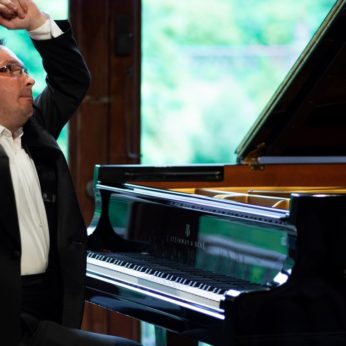Composer: Franz Liszt (b. 1811 - d. 1886)
Performance date: 07/07/2019
Venue: Bantry Library
Composition Year: 1811 - 1886
Duration: 00:09:40
Recording Engineer: Ciaran Cullen, RTÉ
Instrumentation: fl, ob, cl, bn, hn
Instrumentation Category:Solo
Artists:
Alexei Grynyuk -
[piano]

Alexei Grynyuk [piano]
Franz Liszt [1811-1886]
Hungarian Rhapsody no 9 in E flat (Carnival in Pest)
Born in Hungary, educated in Vienna, Liszt moved to Paris with his mother in 1827. As a virtuoso pianist, he was a sensational success. His playing was a mixture of the serious and the show-off. In 1836, he performed the first complete performance of Beethoven’s Hammerklavier Sonata in Paris. This was a time when Parisian audiences could take one movement of a short Beethoven sonata but no more. Berliioz was astounded as were many others. As well as being one of the greatest pianists, Liszt was a highly influential conductor and a prolific and innovative composer.
Liszt was a serious and important musician. He could also be an extraordinary showman. At the end of some concerts, he would be so overcome with emotion that he would collapse into the arms of his page-turner. He would then be carried off stage, apparently unconscious. The audience would go wild, and an announcement would be made that, although Liszt’s health was no longer in danger, he was too weak to appear before the audience again (and play any encores). One trusts that Alexei Grynyuk will survive his performance completely unscathed.
Although Liszt appears, at times, to be faintly ridiculous, his huge following was based on the exhilerating influence of a mixture of charisma, showmanship and skill. He became very rich and very powerful but was a generous and good friend to the many musicians who sought his help. His social circle was enormous. At least twelve of the composers whose works are being performed at this festival, knew Liszt personally.
The Hungarian Rhapsodies belong in the show-off end of his repertoire. They also serve to reinforce the often rather tenuous links between Liszt and the country of his birth. Pest is the part of Budapest that lies on the Eastern, less fashionable side, of the Danube. It is said that Liszt visited the Carnival there to collect tunes played by folk and gypsy musicians for this Rhapsody. This is possible but as the other great Hungarian composer, Bela Bartók, who had spent many years collecting folk and gypsy tunes, said of this Rhapsody: Liszt once again succeeds in creating a work of perfect authenticity.
The many changes of tempi in the Rhapsody indicate, perhaps, fleeting glimpses of different Carnival performers as they swirl by. There are many brilliant moments which are clearly for the virtuoso. There are many others of charm, wit, and even beauty. You should revel in this crazy music.
David Winter
Copyright © 2025 West Cork Music. All rights reserved.
Designed and developed by Matrix Internet